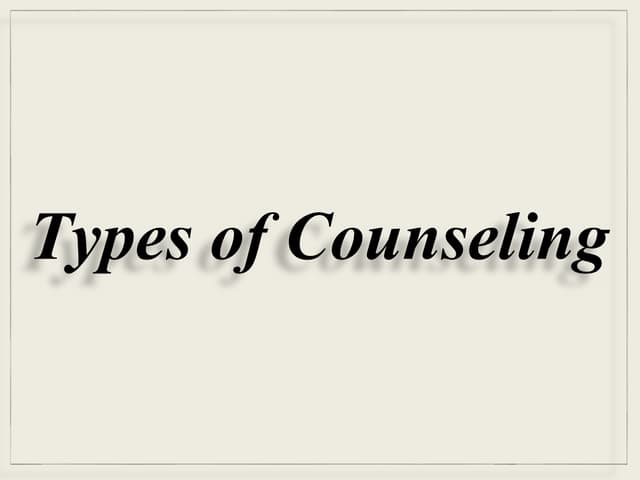A Comprehensive Overview to the Different Kinds Of Coaching and Their Influence
Counseling includes a range of therapeutic techniques, each created to fulfill unique mental health needs. From the organized methods of Cognitive-Behavioral Therapy to the understanding nature of Person-Centered Therapy, these methods offer distinctive pathways to individual development. Household therapy and Dialectical Behavior modification provide extra frameworks for recovery, while team therapy cultivates community support. Understanding these varied techniques can brighten their extensive influence on specific well-being. What remains to be discovered are the ins and outs of each technique.

Comprehending Cognitive-Behavioral Therapy (CBT)
Although lots of therapeutic methods exist, Cognitive-Behavioral Therapy (CBT) sticks out as a result of its organized, goal-oriented nature. This type of therapy is based on the property that thoughts, feelings, and actions are adjoined, and by altering negative thought patterns, individuals can change their emotional feedbacks and actions. CBT employs various techniques, such as cognitive restructuring, which helps customers recognize and challenge altered beliefs. Behavior activation encourages involvement in pleasurable tasks to combat clinical depression.
Commonly, CBT is a temporary therapy, often long-term in between 12 to 20 sessions, making it obtainable for those seeking quick outcomes. Its performance has actually been well-documented in dealing with stress and anxiety problems, depression, and other psychological wellness problems. The therapist's role is to direct customers through exercises and homework projects, cultivating self-awareness and advertising long-lasting coping approaches. This practical approach empowers individuals to take control of their psychological wellness, eventually resulting in improved life contentment.
Discovering Person-Centered Therapy
Person-Centered Treatment, established by Carl Rogers, uses a different technique to Cognitive-Behavioral Therapy by stressing the customer's subjective experience. This therapeutic design focuses on the individual's point of view, fostering a setting of empathy, genuine favorable respect, and credibility. By allowing clients to discover their sensations and ideas without judgment, therapists assist in personal development and self-discovery.
The core tenet of Person-Centered Treatment is the belief that individuals have the inherent ability for self-healing and personal advancement. In this setup, the specialist works as a supportive overview rather than a regulation authority, motivating customers to take charge of their very own trip. This strategy is specifically effective for those grappling with problems such as low self-confidence, anxiety, or anxiety, as it equips them to face and comprehend their feelings. Ultimately, Person-Centered Treatment grows a strong therapeutic alliance, cultivating trust and visibility important for purposeful modification.
The Role of Family Members Treatment in Healing
Household treatment functions as an important component in the recovery process for people and their partnerships. This healing approach focuses on improving interaction, resolving problems, and fostering deeper links among member of the family. By addressing useless dynamics, household treatment urges each member to express their ideas and sensations in a safe atmosphere, advertising understanding and compassion.

The impact of family treatment prolongs past the sessions, as enhanced connections can lead to enhanced psychological wellness for all involved. On the whole, family treatment plays an essential role in recovery by fostering unity, resilience, and shared assistance amongst member of the family, inevitably leading them toward a healthier, a lot more meeting life together.
Unloading Dialectical Behavior Modification (DBT)
Building on the structure of therapeutic approaches that boost psychological health, Dialectical Behavior modification (DBT) provides an organized framework for individuals having a hard time with intense emotions and behavior obstacles. Established by Marsha Linehan, DBT incorporates cognitive-behavioral techniques with mindfulness techniques, intending to help clients take care of frustrating sensations and enhance interpersonal efficiency.
The therapy is particularly advantageous for those detected with Borderline Individuality Problem yet is likewise appropriate to an array of other psychological health concerns. low cost therapy. DBT consists of private treatment sessions and skills training groups, concentrating on four key ability collections: mindfulness, distress resistance, feeling guideline, and interpersonal performance
The Benefits of Team Coaching Procedure
While specific treatment gives beneficial understandings, team counseling sessions use one-of-a-kind advantages that can greatly enhance the therapeutic experience. One important benefit is the feeling of area that arises amongst participants. Individuals commonly find convenience in sharing their experiences with others facing comparable difficulties, cultivating a helpful environment that decreases feelings of seclusion.
Additionally, group sessions encourage varied point of views, permitting individuals to pick up from each various other's coping approaches and understandings. This collective wisdom can result in improved problem-solving capabilities and a broader understanding of personal concerns.
Furthermore, group therapy commonly promotes accountability, as participants motivate each other to seek their goals and abide by their dedications. The cost-effectiveness of team treatment makes it an obtainable alternative for several individuals looking for support. Generally, the collective nature of team therapy sessions can significantly improve the healing trip.
Regularly Asked Inquiries
What Qualifications Do Therapists Required to Exercise Therapy?
Therapists usually call for a relevant degree in psychology or therapy, along with supervised professional experience. Additionally, they have to obtain proper licensure or qualification to practice legally, guaranteeing adherence to expert standards and honest guidelines.
How Do I Choose the Right Kind Of Therapy for Me?
Selecting the right sort of therapy includes evaluating individual demands, exploring numerous strategies, thinking about therapist specializeds, and seeking referrals. Recognizing specific goals and choices can substantially improve the efficiency and contentment of the healing experience.

Are Online Counseling Sessions as Effective as In-Person Ones?
The efficiency of on-line counseling sessions compared to in-person ones often relies on individual preferences and situations. Research study indicates that both methods can yield positive outcomes, though some might locate greater convenience in face-to-face communications.
The Length Of Time Does Therapy Generally Last?

What Should I Anticipate Throughout My Very First Counseling Session?
During the initial counseling session, clients can expect an intro, discussion of their worries, establishment of objectives, and a summary of the counseling process - low cost therapy. This preliminary meeting intends to construct connection and guarantee comfort